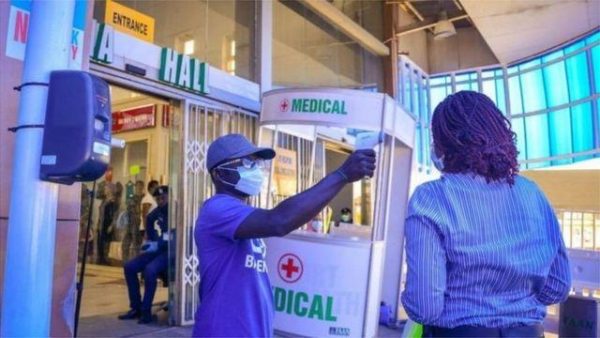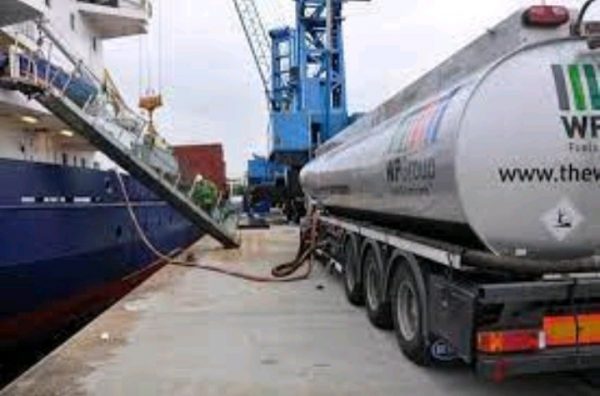Opportunities In West African Oil & Gas Shipping Clusters- Dakuku

DR. Dakuku Adol Peterside Director-General/CEO, Nigerian Maritime Administration and Safety Agency (NIMASA). During the recent 2018 Oil Trading and Logistics (OTL) Africa Downstream Week, he presented this apt paper on “Harnessing Opportunities In The West African Oil & Gas Shipping Clusters”. Read on:
Introduction
Shipping has always been of strategic importance to the oil and gas industry. Not only is over 70% of all crude oil production transported by ships, more and more oil production activities are now being carried out offshore.
This shows that the oil industry relies heavily on the maritime/shipping industry for its smooth operations. Whatever happens in the oil and gas industry is likely to affect the shipping industry and vice versa. In the past decade, the world has witnessed a lot of innovations and technological advancements in oil and gas exploration and exploitation leading to improved output and reduced cost of productions
Although Africa is a relatively small producer of hydrocarbon for the world market, West Africa’s gas production has been boosted significantly by rising demand for power following completion of several gas-fired power plant in Nigeria, Ghana, Cote d’Ivoire and Cameroon giving the sector a positive outlook.
New fields have come on-stream and production ramp-up on existing fields in the oil & gas sector. The intensified production activities up to deep offshore location, has a great future for business opportunities.
However, Infrastructural constraints will continue to hamper significant output in West Africa’s oil and gas sector unless we harness the opportunities in West African Oil & Gas Shipping Clusters.
Offshore activities have also been boosted in Senegal and Guinea leading to Oil majors taking stakes offshore and investing in exploration activities.
Opportunities in the West African Oil & Gas Shipping Clusters – The West African Oil & Gas
Shipping Clusters refer to “Shipping Business providers” within the West African Oil & Gas Zones working to meet the needs of the sector. The maritime world is getting more complicated and so are new and exciting opportunities springing up:
1. Offshore Oil & Gas Services and Supply Industries
The offshore oil and gas services and supply industries are arguably the largest exporter of offshore extraction support services. This sector alone accounts for more than a quarter of the value of production in the maritime economy.
Operators in this sector have acknowledged reputation in deep and ultra-deep offshore operations, with specially designed fleets performing the important survey and construction tasks necessary for the exploration and exploitation of oil and gas deposits at sea. They include equipment suppliers and services providers, particularly ship-owners and operators and engineering and design firms.
In coming years, developments in deep and ultradeep offshore are likely to be the main source of
growth in offshore oil and gas production.
2. Shipbuilding and Repair yards
There are huge investment opportunities in building of vessels to meet national and cabotage requirements.
Dry Docking remains a critical area of investment with over 3,500 vessels operating in Nigeria waters.
Nigeria has quite a few ship yards in operation but the capacity remains an all time low.
Construction and Repair of Merchant ships, Service vessels & Fishing boats
In-service support
Marine product & equipment suppliers
NIMASA’S Modular Floating Dockyard. Fifth Largest in Africa and largest in West Africa.
3. Shipping Finance
With increase in activity in the oil and gas sector there is a resurgence in ship building and infrastructure projects which have investment potentials. Shipping is capital intensive and there is need to have access to fund to support ship financing and dedicated investment analysts. Ship Finance Companies or Triple A funding institutions are encouraged to form alliance to render sector specific services.
4. Ship Broking firms
Acting as intermediary between the supply and demand sides of ship chartering, ship building & sales and dismantling markets.
5. Marine Insurance service providers
A very critical aspect of the maritime value chain is marine insurance. There are growing opportunities in the marine insurance sub sector, to cover hull and machinery, cargoes & passengers risks etc. However the Insurance covers must suit the needs of the fast changing global market.
Our marine insurance network market should be:
Internationally focused
Offer innovative products
Quality conscious
Provide full loss cover
Reliable & credit worthy etc.
Economic dynamics and global changes account for ongoing transformation and reforms in ports in West Africa. Businesses are evolving rapidly embracing technology and innovation. The pace and scope of change is impressive. The combination of significant infrastructure investments and a growing network of transport links is vastly improving physical connectivity and logistics efficiency in West Africa.
Efficiencies in logistics and developing good intermodal connectivity are important for the West African region given the geographical challenge of vast hinterlands and land-linked states. Without efficient inland connections, trade and transport costs will continue to pose significant hurdles for growth.
From a shipping cluster development perspective, Port cities are well-positioned to pursue diversification as landing pads for investments and through the confluence of flows centered around the port.
Attracting a good ecosystem of players would help to anchor value-added business and catalyze new growth opportunities amongst adjacent sectors. The emergence of hub ports in West Africa is a key value proposition that could help to further attract complementary investments and activities to drive future growth.
Our ports should be able to accommodate larger vessels and LNG Carriers and boast of:
High quality infrastructures, including berths & terminals
Modern efficient equipment
Newly constructed LNG terminals
Storage & distribution logistics operations
Efficient road and bulk transport services (rail, navigable waterways).
As an industry, we must adapt to changes and develop in sync with shifts in the broader trade and logistics ecosystem.
Ports are now much more than transit points. They provide added value for which there is a real demand, such as the processing of products, financial breaks in free trade zones, specialized packing methods etc. Supply chain logistics (transport of raw materials usually in bulk) accounts for two thirds of shipping traffic, while distributing logistics (manufactured products usually transported in containers) account for the third.
Transporting cargoes from door to door remain a huge area for investors. Need for modern haulage and logistics for effective operational system. The likes of Amazon and Alibaba are shaking up the shipping and logistics industry with new business models enabled by technology. Traditional players are also branching out to explore new partnerships and growth strategies.
8. Marine Renewable Energy, Storage and Services
The Marine Renewable Energy (wind, current, tidal, wave and ocean thermal energy) is the world’s second largest maritime zone.
Africa is lagging behind in marine renewable energy technology. The development of marine renewable energies require knowledge and knowhows that are specific to our marine environment.
West Africa’s offshore oil and gas deposits remain under explored and exploited.
West Africa is playing no significant role in seabed mining and exploration.
9. Computing and Electronic Services
Electronic & Information technology make up a key over- arching sector of the maritime economy.
The application of innovative technology is possibly the strongest determinant of development in any sector. We need to overcome our limitation if we want to deliver the highest value in terms of efficiency, quality and reliability of service.
Automation and digital solutions are potential gamechangers that will strengthen our competitiveness.
To harness technology, we need to look at Automation, Data and Information System (the Internet-of-Things) and Work flow optimization. We are challenged by a future where technologies such as autonomous vessels, data analytics, block-chain and IoT will fundamentally transform oil and gas and the shipping sector. We must utilize technology to remain competitive in an increasingly digitalized maritime landscape.
Expertise in the field of electronics will help bind our naval, offshore and Marine Renewable Energy (MRE) industries together. Computer tools, along with virtual platforms are essential for ship design and construction, ship control, weaponry, defense and self protection systems, the development of MRE and even educating and training seamen or qualified personnel.
Classification societies play predominant roles in maritime transport by ensuring that ships are built and operated according to satisfactory safety standards.
11. Maritime Safety and Security Industries
Increasing globalisation has exposed all maritime activities to new challenges and threats. Maritime
Safety and Security Industries are expected to play vital roles in ensuring effective and efficient maritime
security by:
Monitoring sea transport to prevent and protect threats such as terrorist attacks, piracy and illicit
trafficking at sea, etc.
Supervising maritime activities to protect marine resources, preserve the environment and provide Search and Rescue services.
12. Manpower & Human Capacity Development Services
The availability of manpower is crucial to development of West Africa’s oil and gas sector. Various segments of the oil & gas/shipping sector require professionals to help the industry sustain its momentum. Large opportunities exist in establishment, upgrading of facilities and management of maritime institutions.
We need to train our young generation to develop cross disciplinary skills required in today’s world by providing professional development course focusing on advanced maritime technologies, cyber security, maritime and port management, supply chain management etc.
13. Maritime Law and Law of the Sea Experts
The law relating to activities and sea is based primarily on Maritime Law and the Law of the Sea
Maritime law is the law of things, activities and events related with the sea. Specifically, it deals with matters concerning sea going personnel, ships and other seagoing vessels, charter contracts and ocean transport, ship ownership and sales, maritime safety incidents at sea and marine insurance.
The law of the sea on the other hand is the law of maritime space, it defines its zones as well as the rights and obligations of States in these zones, especially in regard to environmental protection and law and order at sea.
These maritime law experts are there to inform and advise, act on behalf of clients, draft legal documents where necessary.
14. Advisory Firms
Firms providing services in project management, architecture, design or even environmental studies have become of growing importance in the oil and gas sector. Some of these firms are able to deliver expertise essential for business development in areas such as strategic analyses and studies, communication and the media, institutional relation and management of organizations and ship management.
15. Maritime Research and Development
Our maritime training institutions should be strengthened and repositioned to provide maritime education and R&D as well as major technological advancement and invention to stimulate growth.
Challenges in West Africa’s Oil and Gas shipping cluster
Maritime insecurity
Lack of requisite infrastructure (ports development and modernization, ports connectivity, lack of dedicated oil & gas terminals, insufficient oil & gas free trade zones or logistics hub etc.)
Absence of West African ships or ocean going vessels
Cross border regulations and protocols
Education, low investment in Research & Development, lack of common platforms and training vessels etc.
Lack of renewable energy in ports
Way Forward
Each of the shipping clusters mentioned earlier though not exhaustive, offer unique strengths and opportunities.
How can West Africa be hub for oil & gas business as well as maritime/shipping at the same time leveraging on each other.
• Regional Integration – This is a key driving force creating economic opportunities across multiple dimensions. The combination of significant infrastructure investments and a growing network of transport links in West Africa will vastly improve physical connectivity and logistics efficiency as well as reduce trade and economic barriers.
• Develop West Africa’s Regional Cabotage and strengthen its local content capabilities:
i. To attain regional sufficiency in tonnage capacity, shipbuilding and seafarers capabilities;
ii. To acquire the technical know-how in ship management, shipbuilding and ship manning;
iii. To enhance the earnings and conservation of foreign exchange for the region;
iv. To preserve the internal and economic security of the region; and
v. To create employment in the maritime industry.
• Long-term strategic planning mind-set – We must carve out developmental plans, take calculated risks and appropriately channel investment to deliver on our vision.
• Beyond planning, we must emphasize the need for concerted and coordinated policy planning approach.
NIMASA recognizes the importance of stakeholder collaboration and synergy among all sectors and in recent transformational steps we are taking, we are not alone, we collaborate with relevant government agencies and industry stakeholders to address cross-cutting issues.
• Harnessing technology for productivity –
Automation and digital solution are proving to be potential game – changers. Technology and automation have helped Small countries like Singapore transcend physical limitations. Whilst the average vessel turnaround time for African Ports is around five days, in Asia and Europe vessel turnaround time can be as fast as seven hours in some cases.
• Vibrant and Interconnected Maritime Ecosystem comprising Port, Logistics and Maritime services.
A robust West African Oil and Gas shipping cluster will help to anchor value-added business and catalase new growth opportunities amongst all players in diverse ecosystem of maritime services.
This will provide good opportunity to strengthen existing partnerships, deepen the pool of shipping groups and maritime services in West Africa and also support emerging businesses.
What is NIMASA doing to restore growth in our economy, invest in our people and build a globally competitive economy:
Driving ship-owners quest for Special Interest Rate (single digit)
Seeking dedicated intervention fund for vessel acquisition and ancillary transactions
Seeking approval for Special Forex Window
Driving review of fiscal policies militating against favourable trade competition and growth of the sector
Review of trade terms from FOB to CIF
Sea time training for our Cadets
Drive for investment incentives
The Deep Blue Scale Up Initiative to ensure a safe and secure maritime domain up to the Gulf of Guinea
Addressing major concerns militating against full optimization of the Cabotage Regime
Drive for full automation, upgrade and modernization of the Nigerian Ship Registry.
Conclusion
West Africa’s economic outlook today is bright. With large reserves of untapped resources and significant export potential, the region will undoubtedly play a significant role in the global trade and commodity value chain.
Government and industry stakeholders must cooperate to drive development of local content capabilities and growth in the oil & gas shipping sector. Greater investments in oil and gas will translate to more demand for offshore support vessels.







